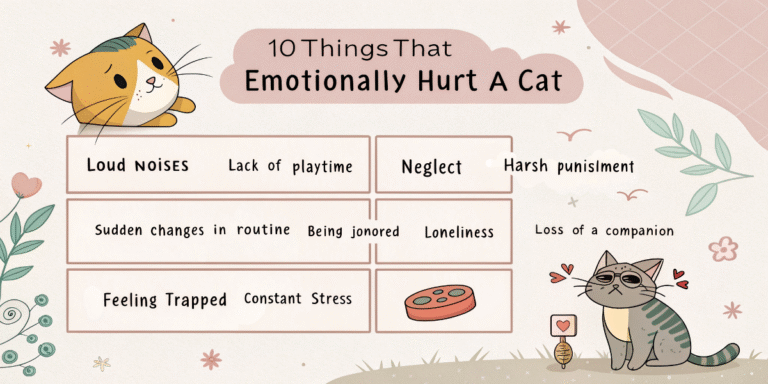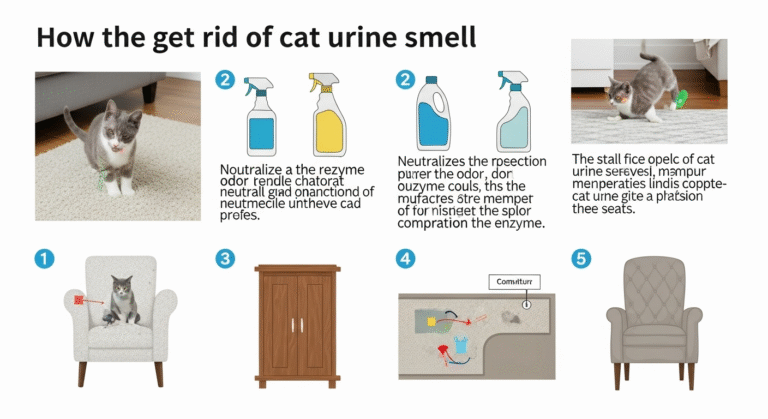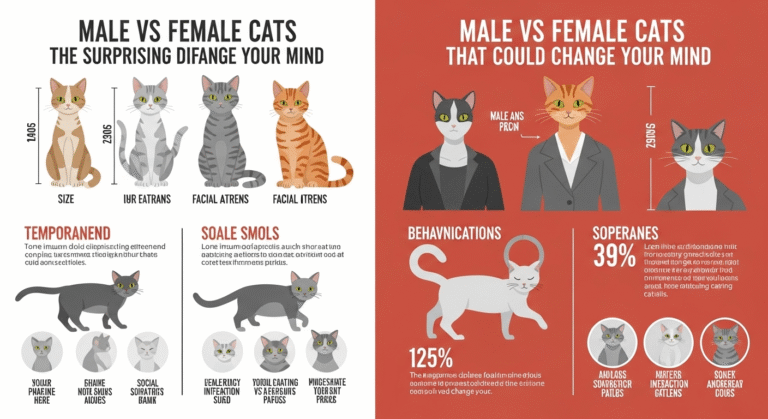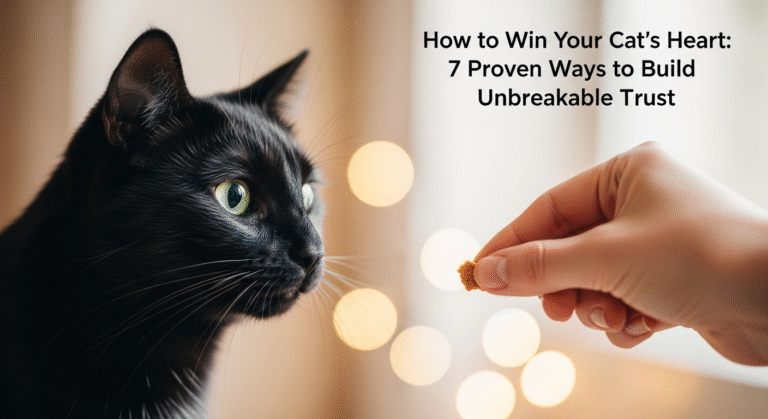🐾 What Your Cat’s Sleeping Positions Reveal About Their Health, Emotion & Personality
- 🛌 The 8 Most Common Cat Sleeping Positions Explained
- 1. 🍞 The Loaf Position—Relaxed Yet Ready
- 2. 😴 Side Sleeper—Total Relaxation Mode
- 3. 🦸 Superman Pose—Fast Asleep But Ready to Fly
- 4. 🍩 The Donut Pose—Cozy and Cautious
- 5. 👑 The Sphinx Pose—Regal and Ready
- 6. 🐾 Paws Outstretched—Light Sleep, Always Alert
- 7. 🧡 Belly Up—Ultimate Sign of Trust
- 8. 💤 Twitching Limbs—Dreaming of Chasing Mice
- 🏠 Where They Sleep Says Even More
- 🧼 How to Help Your Cat Sleep Better
- Final Thoughts
Cats are known for their mysterious nature—and one of the most fascinating aspects of their behavior is how they sleep. From curled up like a donut to sprawled out like a loaf of bread, your cat’s sleeping positions can actually tell you a lot about how they’re feeling emotionally and physically and even what kind of personality they have.
In this article, we’ll decode the most common cat sleeping positions, explain what each one means, and explore the meaning behind where your cat chooses to sleep. Plus, we’ll give you some insight into when certain postures might be cause for concern.
🛌 The 8 Most Common Cat Sleeping Positions Explained
Here’s a breakdown of the top feline sleeping poses, complete with their meanings, emotional cues, and health implications.
| Sleeping Pose | Description | Emotional Meaning | Personality Traits | Health Signals |
|---|---|---|---|---|
| The Loaf | Paws tucked under the body, tail wrapped close, resembling a loaf of bread. | Feels safe but still alert. | Cautiously confident, relaxed yet vigilant. | Normal unless accompanied by excessive tension. |
| Side Sleeper | Lying on their side, limbs stretched out. | Deeply relaxed and trusting. | Confident, calm, sociable. | Could indicate discomfort if avoided. |
| Superman | Belly down, legs stretched out as if flying. | Comfortably asleep but ready to move. | Playful, assertive, energetic. | May signal spinal issues if frequent or paired with stiffness. |
| The Donut | Curled tightly into a ball, often with tail over face. | Seeking warmth and protection. | Shy, cautious, self-protective. | Common in cold environments; generally normal. |
| The Sphinx | Sitting upright with paws tucked beneath, eyes half-closed. | Alert rest, ready to spring into action. | Inquisitive, curious, high-energy. | Often seen during light naps or between play sessions. |
| Paws Outstretched | Front legs stretched forward, sometimes with head resting on them. | Light sleep, easily awakened. | Alert, playful, territorial. | Front legs stretched forward, sometimes with the head resting on them. |
| Belly Up | On their back, belly exposed. | Extreme trust and comfort. | Social, affectionate, confident. | If constant, it may suggest stress or over-vigilance. |
| Twitching/Whisker Twitching | Eyes moving, whiskers twitching, occasional limb movement. | REM (dreaming) stage. | Active imagination, playful mind. | Generally healthy; prolonged shaking could need vet attention. |
1. 🍞 The Loaf Position—Relaxed Yet Ready
When your cat sleeps in the loaf position, it means they feel safe enough to relax but are still keeping their options open. This posture allows them to bolt up and run at a moment’s notice. A study published in the Journal of Feline Medicine and Surgery found that cats who feel secure in multi-cat households or single-pet homes tend to adopt this pose more frequently.
🧠 Personality Clue: Balanced, observant, and confident.
⚠️ Health Note: No red flags here unless your cat seems overly tense or avoids lying down completely.
2. 😴 Side Sleeper—Total Relaxation Mode
This is one of the most vulnerable positions a cat can take—and that’s exactly why it’s such a strong indicator of trust. When your cat lies on its side, it means they’re deeply relaxed and feel completely safe in their environment.
🧠 Personality Clue: Laid-back, confident, and emotionally secure.
⚠️ Health Note: Avoidance of this pose may point to pain or discomfort, especially around the abdomen or chest.
3. 🦸 Superman Pose—Fast Asleep But Ready to Fly
If your cat stretches out flat on their belly with limbs splayed forward like they’re mid-flight, they’re likely in a deep sleep. This pose shows confidence, but it can also be a sign of something else.
🧠 Personality Clue: Bold, adventurous, and playful.
⚠️ Health Note: Frequent use of this pose may indicate spinal discomfort. Watch for signs like limping, reluctance to jump, or sensitivity to touch.
4. 🍩 The Donut Pose—Cozy and Cautious
Curled into a tight circle, your cat is conserving body heat and protecting their organs. While this posture suggests safety, it also hints at a bit of self-preservation instinct.
🧠 Personality Clue: Reserved, cautious, and thoughtful.
⚠️ Health Note: Completely normal unless done excessively in warm environments, which may suggest anxiety or insecurity.
5. 👑 The Sphinx Pose—Regal and Ready
With front paws tucked under and eyes half-lidded, the Sphinx pose is all about being alert while resting. A study from the Journal of Veterinary Behavior Science linked this pose to higher energy levels and readiness for activity.
🧠 Personality Clue: High-energy, curious, always game for play.
⚠️ Health Note: Indicates active lifestyle; no concerns unless paired with unusual behaviors.
6. 🐾 Paws Outstretched—Light Sleep, Always Alert
Your cat is clearly in a light sleep stage if they’re resting with their paws outstretched. This position makes it easy for them to spring into action quickly.
🧠 Personality Clue: Vigilant, territorial, always aware of surroundings.
⚠️ Health Note: Too much time in this pose may suggest chronic alertness or stress. Consider calming strategies like evening playtime.
7. 🧡 Belly Up—Ultimate Sign of Trust
Exposing the belly is a huge sign of trust because it’s one of the most vulnerable areas on a cat’s body. Cats only do this when they feel completely safe.
🧠 Personality Clue: Affectionate, social, and confident.
⚠️ Health Note: Also helps regulate body temperature. If they seem overheated, ensure the room isn’t too warm.
8. 💤 Twitching Limbs—Dreaming of Chasing Mice
During REM sleep, cats may twitch, move their whiskers, or even make small sounds. This is when they dream—often chasing imaginary prey.
🧠 Personality Clue: Imaginative, playful, mentally engaged.
⚠️ Health Note: Perfectly normal. However, if twitching becomes violent or persistent, consult your vet.
🏠 Where They Sleep Says Even More
Just as important as how your cat sleeps is where they choose to snooze. Each location tells a unique story about their comfort level, preferences, and sense of security.
| Sleeping Spot | What It Means |
|---|---|
| Windowsill | Loves the sun and enjoys watching birds or people. Multitasking: soaking up warmth and guarding territory. |
| On Your Bed | Craves closeness and comfort. Smells like their favorite human = ultimate relaxation zone. |
| High Places (Shelves, Cupboards) | Seeks safety and dominance. Elevated spots offer a bird’s-eye view of their domain. |
| Inside Boxes | Natural ambushers love enclosed spaces. Boxes provide a secure hideout and mental stimulation. |
| On Your Sofa or Chair | Claims your space as theirs. Strategic spot gives them a panoramic view of the room. |
🧼 How to Help Your Cat Sleep Better
Want your cat to feel safer, sleep deeper, and dream longer?
✅ Establish a routine: Cats thrive on consistency.
✅ Play before bed: Tiring them out leads to deeper sleep.
✅ Create cozy zones: soft blankets, warm beds, and quiet corners.
✅ Maintain optimal temperature: Keep the house comfortable, especially for short-haired or senior cats.
✅ Minimize disruptions: Loud noises or sudden changes can affect sleep quality
Final Thoughts
Your cat’s sleeping habits are far more than just cute poses—they’re windows into their world. Whether they’re loafing, lounging, or leaping into dreams, every position has a message.
By understanding these signals, you can better connect with your feline friend, support their well-being, and strengthen your bond.
🐾 Stay observant, stay caring, and keep loving your kitty—because they’re telling you everything you need to know… through sleep.
Don’t forget to subscribe for more insightful and adorable cat content! See you in the next post.






